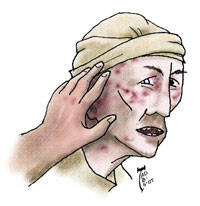Bringing Outsiders In
Those who suffer chronic illness may experience themselves as being outside all of the usual spheres of human activity. As the workplace carries on without them and their family goes about its business, they can feel isolated, out of the loop, helpless to contribute to the daily doings, left alone with their own suffering. While Christianity does not have regulations concerning ritual uncleanness and separation from sick persons, certain contagious conditions may require physical isolation. Even when this is not the case, however, many avoid persons with illness. It can seem to such a person that even God is keeping at a distance. The loneliness can be as bad as or worse than the illness itself.
In today’s Gospel, a man with leprosy leaves his prescribed separate space and reaches out for Jesus’ help. He is tentative in his request, “If you wish, you can make me clean.” Jesus responds with deep emotion. The verb splanchnizomai, usually translated “moved with compassion,” literally means to “have a gut reaction,” that is, to be moved in the inward parts, the entrails. Ancient peoples considered the intestines as the seat of emotion. Mark’s use of this strong verb emphasizes the depth of Jesus’ feeling for the person with leprosy. Instead of recoiling from the man, Jesus reaches out his hand to him, touches him, and says how much he wants to be with the man and to see him “be made clean” and reintegrated into the life of the community. And so it happens.
Jesus’ oneness with the person who had been ostracized because of his leprous condition is emphasized at the end of the episode, when Jesus experiences an outsider status similar to that of the man with leprosy. Jesus “remained outside in deserted places,” perhaps not only because of the crowds who kept coming to him, but also because he deliberately sought to be in solidarity with those who were relegated to isolated places, offering them the compassion of God who wants to be one with them.
This Gospel offers encouragement to those who suffer illness or disability, that they may reach out in prayer to Jesus and to the believing community, to ask not only for compassion, but also for incorporation into the community of faith. Likewise, it reminds those who are well not to avoid or to relegate to the sidelines those who are ill or who have disabilities, but to stretch out their hands to them, recognizing the gifts they bring for spreading the Gospel. At the end of today’s Gospel, the man who had leprosy proclaims the story everywhere. Some translations render the expression keryssein ton logon, as “publicize the whole matter,” but it literally says “preach the word.” There is a powerful word to be preached both by those who are well and by those who have an illness or disability.
In the second reading Paul tries to keep the Corinthians from breaking themselves up into insiders and outsiders. When he says he tries to “please everyone in every way,” he is not talking about changing his stripes to fit others’ expectations or having no firm moral convictions. Rather, Paul is advising them that they must always seek the common good and make their choices based on what will best give glory to God. This passage is the conclusion of a lengthy discussion about whether it is proper for Christians to eat meat sacrificed to idols. Some thought it permissible to do so, while others were adamantly opposed to it. Paul sides with the former, but urges those who think as he does to forgo exercising what they believe to be their right. Paul, as a good pastoral leader, offers to these Corinthians his own example of relinquishing his preferences for the sake of the common good.
BARBARA E. REID
This article also appeared in print, under the headline “Bringing Outsiders In,” in the February 9, 2009, issue.








